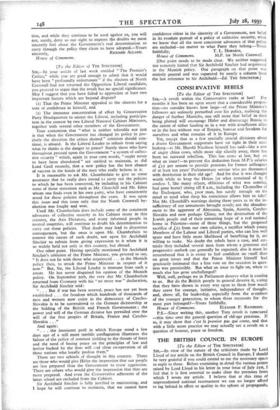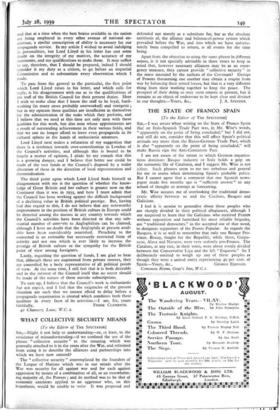THE BRITISH COUNCIL IN EUROPE
[To the Editor of THE SPECTATOR] Stit,—In view of the nature of the criticisms made by Lord Lloyd of my article on the British Council in Europe, I should be very grateful if you could extend to me the necessary space to reply to these. Before examining in detail the various points raised by Lord Lloyd in his letter in your issue of July nst, I feel that it is first essential to make clear the premises from which I wrote my artide. I believe that at this time of unprecedented national rearmament we can no longer afford to lag behind in effort or quality in the sphere of propaganda,
and that at a time when the best brains available in the nation are being employed in every other avenue of national en- deavour, a similar conscription of ability is necessary for our propaganda service. In my article I wished to avoid indulging in personalities, but Lord Lloyd in his letter has cast some doubt on the integrity of my motives, the accuracy of my statements, and my qualifications to make them. It may suffice to say, therefore, that I should be prepared, indeed I should consider it my duty as 'a citizen, to go before an impartial Commission and to substantiate every observation which I made.
To pass from the general to the particular, the first point which Lord Lloyd raises in his letter, and which calls for reply, is his disagreement with me as to the qualifications of the staff of the British Council for their present duties. Here I wish to make clear that I know the staff to be loyal, hard- working (in many cases probably overworked) and energetic ; but in my opinion these qualities are insufficient in themselves for the administration of the tasks which they perform, and I believe that we need at this time not only men with these qualities for this work, but also men whose appointments are a result of outstanding achievement in their various fields, and that we can no longer afford to leave even propaganda in its cultural sphere in the hands of enthusiastic amateurs.
Lord Lloyd next makes a refutation of my suggestion that there is a tendency towards over-centralisation in London of the Council's activities, and although this is bound to be largely a matter of opinion, I abide by my remark that this is a growing danger, and I believe that better use could be made of the vast funds at the Council's disposal by a wider allocation of these in the direction of local representation and decentralisation.
The third point upon which Lord Lloyd finds himself in disagreement with me is the question of whether the know- ledge of Great Britain and her culture is greater now on the Continent than it was in 1935, and here I must admit that the Council has been working against the difficult background of a declining value in British political prestige. But, having had due regard to this, I do not believe that any noteworthy improvement in the position of British culture in Europe could be detected among the masses in any country towards which the Council's activities have been directed or that any sub- stantial number of converts to Anglophilisrn can be claimed, although I have no doubt that the Anglophils at present avail- able have been considerably nourished. Preaching to the converted is an estimable but necessarily restricted form of activity and not one which is ever likely to increase the prestige of British culture or the sympathy for the British point of view among foreigners.
Lastly, regarding the question of funds, I am glad to hear that, although these are augmented from private sources, they are controlled by a body representative of all political points of view. At the same time, I still feel that it is both desirable and in the interest of the Council itself that no secret should be made of the nature of these outside subscriptions.
To sum up, I believe that the Council's work is enthusiastic but not expert, and I feel that the exigencies of the present situation are such that we cannot afford to delay before a propaganda organisation is created which combines both these qualities in every facet of its activities.—I am, Sir, yours faithfully, FRANK CLEmENTs. 40 Chancery Lane, W.C. 2.









































 Previous page
Previous page